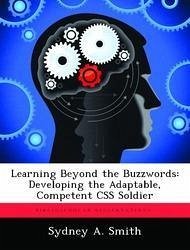This monograph examines junior CSS soldier training programs against current learning theory in order to determine how the Army should structure its institutional and self-development programs to optimally develop Combat Service Support (CSS) soldiers to be adaptable, tactically and technically competent, and able to perform in any environment throughout today's battlefield. To accomplish this task, this work employs classic problem analysis. First, current and future requirements of a CSS soldier are identified by delving into concept papers, future doctrine, and current operations (specifically, Operation Enduring Freedom, or OEF, and Operation Iraqi Freedom, or OIF). The second step surveys psychological aspects of learning in order to identify criteria for developing programs to effectively train CSS soldiers. This section covers major current theories of learning (including behaviorism, constructivism, and other theories applicable to adult learning) and attempts to derive holistic guidelines from seemingly divergent sometimes narrow theories. The paper next investigates two potential training models, the current institutional and self-development program for Unit Supply Specialists, and a proposal developed by the Army Research Institute to train the future multi-skilled CSS soldier. The models are compared with the established learning criteria to determine strengths and weaknesses. The paper finds that current and proposed training models employ a behavioral emphasis that is suitable for training technical and tactical competence, but is less appropriate for developing flexible, adaptable junior leaders. The programs also strongly encourage self-development through distance learning, but do not clearly articulate the purpose of self-development, or ensure available training programs are effective means to achieve that purpose. To foster adaptability in its junior CSS soldiers, the Army must embrace a culture that views life-long learning as essential (not j
Hinweis: Dieser Artikel kann nur an eine deutsche Lieferadresse ausgeliefert werden.
Hinweis: Dieser Artikel kann nur an eine deutsche Lieferadresse ausgeliefert werden.








